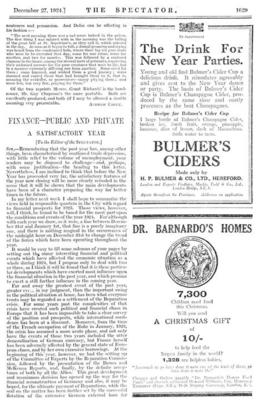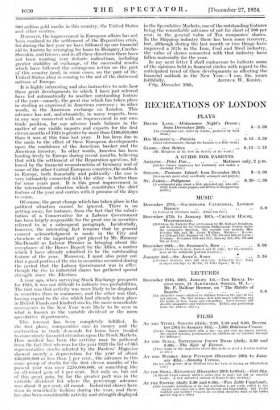FINANCE-PUBLIC AND PRIVATE
A SATISFACTORY YEAR
[To the Editor of the SPECTATOR.] Srn,—Remembering that the past year has, among other things, been characterized by continued trade depression, with little relief to the volume of unemployment, your readers may be disposed to challenge—and, perhaps, with some justificationthe heading to this letter. Nevertheless, I am inclined to think that before the New Year has proceeded very far, the satisfactory features of the year now closing will be more clearly revealed in the sense that it will be shown that the main developments have been of a character preparing the way for better times in the future.
In my letter next week I shall hope to summarize the views held in responsible quarters in the City with regard to financial prospects for 1925. Those views, however, will, I think, be found to be based for the most part upon the conditions and events of the year 1924. For although with each year we draw, as it were, a line between Decem- ber 31st and January 1st, that line is a purely imaginary one, and there is nothing magical in the occurrences of the midnight hour on December 31st to change the trend of the forces which have been operating throughout the year. It would be easy to fill some columns of your paper by setting out th% many interesting financial and political events which have affected the economic situation as a whole during 1924, but I propose only to deal with two or three, as I think it will be found that it is these particu- lar developments which have exerted most influence upon the financial situation in the past year, and which promise to exert a still further influence in the coming year.
Far and away the greatest event of the past year, greater evei, in my judgment, than the important swing in the political situation at home, has been what everyone trusts may be regarded as a settlement of the Reparation crisis. For some years past the complexities of that crisis have created such political and financial chaos in Europe that it has been impossible to take a clear survey of the position and prospects, while international confi- dence has been at a discount. Moreover, from the time of the French occupation of the Ruhr in January, 1923, the crisis has assumed a more acute phase, and not only have the events of those two years included the utter demoralization of German currency, but France herself has been adversely affected by the general state of Euro- pean chaos, and by her own excessive borrowings. At the beginning of this year, however, we had the setting up of the Committee of Experts by the Reparation Commis- sion, followed by the presentation of the Dawes and McKenna Reports, and, finally, by the definite accep- tance of both by all the Allies. This great development and unanimous decision has opened up the way for the financial reconstruction of Germany and also, it may be hoped, for the ultimate payment of Reparations, while the seal on the matter has been further set by the successful flotation of the extensive German external loan for 800 million gold marks in this country, the United States and other centres.
Moreover, the improvement in European affairs has not been confined to the settlement of the Reparation crisis, for during the last year we have followed up our financial aid to Austria by arranging for loans to Hungary, Czecho- Slovakia, and Greece, and in all these directions there have not been wanting very definite indications, including greater stability of exchange, of the successful results which have followed the courageous action on the part of this country (and, in some cases, on the part of the United States also) in coming to the aid of the distressed nations of Europe.
It is highly interesting and also instructive to note how these great developments to which I have just referred have led automatically to another outstanding feature of the year—namely, the great rise which has taken place in sterling as expressed in American currency ; in other words, in the American exchange on London. This advance has not, unfortunately, in many respects, been in any way connected with an improvement in our own trade position, for our adverse trade balance in the matter of our visible imports and exports for the first eleven months of 1924 is greater by more than £100,000,000 than it was at this time last year. It has been due in the main to the effect of these European developments upon the confidence of the American banker and the American investor. In other words, America has been lending freely to Europe during recent months, believing that with the settlement of the Reparation question, fol- lowed by the financial reconstruction of Germany and of some of the other Central European countries,the outlook in Europe, both financially and politically—the one is very intimately connected with the other—is better than for some years past. It is this great improvement in the international situation which constitutes the chief feature of the year and carries with it promise of the days to come.
Of course, the great change which has taken place in the political situation cannot be ignored. There is no getting away, for instance, from the fact that the substi- tution of a Conservative for a Labour Government has been largely responsible for the great rise in securities referred to in a subsequent paragraph. Incidentally, however, the interesting fact remains that by general consent acknowledgment is made in the City and elsewhere of the important part played by Mr. Ramsay MacDonald as Labour Premier in bringing about the acceptance of the Dawes Report by the Allies, a matter which I have already admitted to be the outstanding feature of the year. Moreover, I must also point out that a good portion of the rise in securities occurred during the period that the Labour Government was in office though the rise in industrial shares has gathered special strength since the Election.
A year ago, when surveying Stock Exchange prospects for 1924, it was not difficult to indicate two probabilities. The first was that activity was more likely to be displayed in securities than in commerce, and the other was that, having regard to the rise which had already taken place in British Funds and .kindred stocks, the more remarkable movements in the New Year were likely to be seen in what is known as the variable dividend or the more speculative departments.
This forecast has been completely fulfilled. In the first place, comparative ease in money and the contraction in trade demands for loans have tended to concentrate financial attention upon the Stock Markets. How marked has been the activity may be gathered from the fact that whereas for the year 1923 the list of 365 representative stocks selected by the Bankers' Magazine showed merely ,n depreciation for the year of about £30,000,000 or less than per cent., the advance in this same group of stocks for the first eleven months of the present year was over £250,000,000, or something like an all-round gain of 4 per cent. Not only so, but out of this great gain, by far the greater part was in the variable dividend list where the percentage advance was about 9 per cent. all round. Industrial shares have , risen in remarkable fashion during the year, and there has also been considerable activity and strength displayed in the Speculative Markets, one of the outstanding features being the remarkable advance of not far short of 100 per cent. in the general value of Tea companies' shares. In the Shipping industry there has been some recovery, but, although during the last month or two things have improved a little in the Iron, Coal and Steel industry, the value of shares connected with that industry have fallen materially for the year. In my next letter I shall endeavour to indicate some of the opinions held in financial circles with regard to the anticipated trend of these developments as affecting the financial outlook in the New Year.—I am, Sir, yours
City, December 19th.



























 Previous page
Previous page